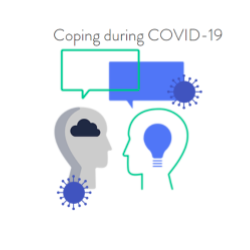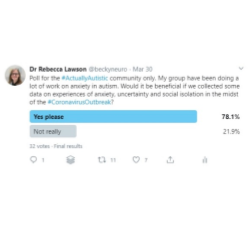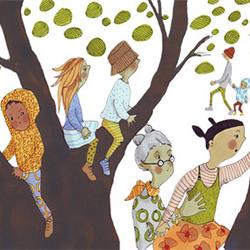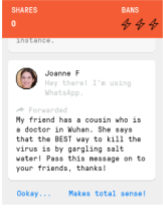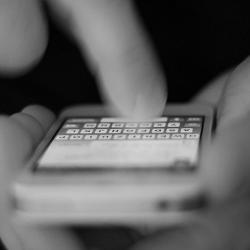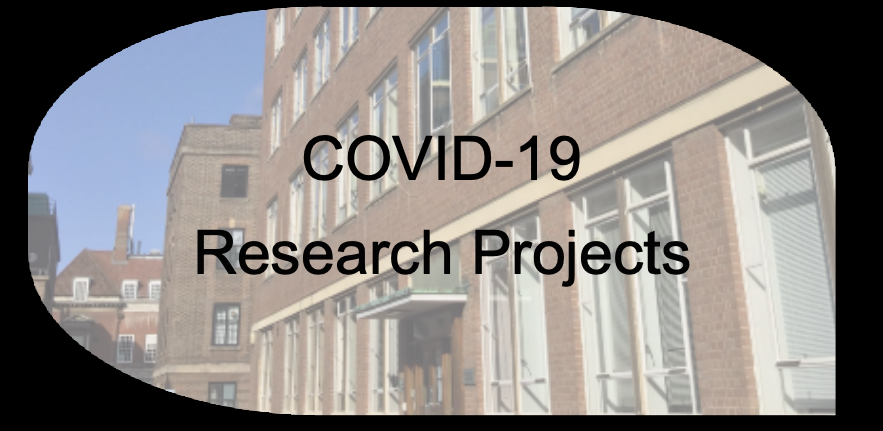
Researchers and experts in the Department of Psychology are continuing to work on research projects to help society understand the impact of the COVID-19 pandemic.
Coping during COVID-19: the effects of lockdown on the autism community
Principal Investigator: Dr Rebecca Lawson
Outline: Dr Rebecca Lawson is working with PhD student (Claudia Lage) and PaL Lab Research Assistant (Timothy Sandhu) to build a picture of how the lockdown measures put in force to tackle the COVID-19 pandemic are affecting the autism community.
The COVID-19 pandemic is an unprecedented global situation which has changed our daily way of life. Lockdown measures are essential to tackle the spread of COVID-19 but we want to understand how these measures are affecting the wellbeing, mental health and everyday routines of autistic and non-autistic adults. Around half of autistic adults have a co-occurring anxiety disorder, so we imagine that this is a particularly difficult time for anxiety management.
There have been a lot of surveys about mental and physical health in the wake of COVID-19, but none specifically aimed at the autism community. So, we took to social media to ask if it would be beneficial to gather some data. 78% of autistic respondents thought this would be worthwhile.
The survey will allow us to quantify how people's mood, wellbeing, routines and experiences have changed since the lockdown measures started. We hope that the data we gather will help us to understand how autistic people can be better supported in the event of future periods of lockdown, or generally when facing periods of social isolation or uncertainty.
For more information see: https://www.lawsonlab.co.uk
Impact of CORONAVIRUS on families with young children
Principal Investigator: Prof Claire Hughes
Outline: Professor Hughes is working with the Centre for Family Research to understand family disruption, with potentially long-lasting behavioural and psychological effects during the Covid-19 lockdown.
Coupled with strict quarantine measures, the recent and unprecedented mass closure of UK schools has led to widespread family disruption, with potentially long-lasting behavioural and psychological effects. Social media has enabled adults and teenagers to maintain connections but are much less suited for very young children, many of whom were just beginning to adjust to school life at the start of the pandemic. History tells us that the overall impact of this crisis is very hard to predict: the period after the First World War and flu pandemic was a morbid era, but the years after the Second World War were an age of optimism.
The proposed work is built upon an existing study that has tracked both mothers and fathers from 180 Cambridgeshire families, in which detailed observations of both mothers and fathers with their infants were gathered at multiple time-points, enabling us to assess children’s cognitive development, social understanding and interactions with peers. The information provides a rich baseline picture that will help us to understand the impact of quarantine upon families and predictors of positive versus negative responses.
Importantly, the social and psychological impact of the pandemic on young families is likely to vary widely across communities and across cultures. Within the UK, we therefore plan to compare families from East Anglia with families in the West Midlands, which has much higher levels of ethnic diversity and urban poverty. Increasing the size of the UK sample will also allow us to make comparisons by family type (e.g., families with NHS workers or families experiencing serious health problems). We also plan to examine societal influences, drawing on more than a decade of experience in cross-cultural research to set up collaborations with partners in China, Italy and North America.
Inoculating against misinformation about COVID-19 - Risk perceptions of COVID-19 around the world
Principal Investigator: Dr Sander van der Linden
Outline: Researchers are working on a Free online COVID-19 educational game/app that “vaccinates” people against misinformation. A browser tool that informs policy-makers about public opinion on COVID-19 around the world.
"We are developing novel gamified interventions to help people spot fake news and misinformation about COVID-19 on social media and elsewhere. We also conduct large-scale representative international surveys on public opinion and preventative health behaviors on COVID-19. Both of these approaches have already started to inform the UK government, social media companies, and policy officials internationally. " - Dr Sander van der Liden
COVID-19 Game
In this project, we will build on the success of our previous work on pre-bunking and the Bad News game to develop and test a short, flexible online game that trains people to recognise the most common manipulation strategies used to spread misinformation about Covid-19.
To achieve this, the game will simulate a social media environment in which misinformation about the virus is shared and forwarded (see image). With each playthrough, the player is given the option to learn about one of the following techniques: impersonating fake authority figures (such as health experts); spreading conspiracy theories; and using emotional language to whip up fears about the virus and its consequences. Replaying the game will be encouraged at the end, so that players are incentivised to learn about all 3 techniques. The game will take approximately 2-3 minutes to complete, and will make use of both humour and perspective-taking (e.g. by taking on the role of a disseminator of misinformation), both of which have been shown to have significant cognitive benefits in terms of player involvement and the effectiveness of the inoculation.
The goal of this project is to develop a free-to-play stand-alone online game about misinformation about the Covid-19 epidemic. This game will be available in any browser and can be played on phones, tablets and personal computers. To get an idea of how this will work, one may look at our online game Bad News. The Bad News game is played by about a million people internationally and was covered by every major news outlet worldwide.
The game’s website will also feature additional information about the game, how inoculation theory and misinformation work, and an information sheet for educators explaining how to use the game in educational settings. Players will also be directed to links to reliable information about the virus, e.g. from the WHO and the NHS. The game’s website will thus also serve as a resource database for people to learn more about misinformation and the Covid-19 epidemic.
References:
- Bavel, J.J.V., Baicker, K., Boggio, P.S. et al. (2020). Using social and behavioural science to support COVID-19 pandemic response. Nat Hum Behav
- Dryhurst, S., Schneider, C., Kerr, J., Freeman, A., Rechia, G., van der Bles, A.M., Spiegelhalter, D., & van der Linden, S. (2020). Risk perceptions of COVID-19 around the world. Journal of Risk Research.
- Goldberg, M., Gustafson, A., Maibach, E., Linden, S., Ballew, M. T., Bergquist, P., … Leiserowitz, A. (2020). Social norms motivate COVID-19 preventive behaviors. PsyArXiv.
- Van Bavel, J. J., Baicker, K., Boggio, P. S., Capraro, V., Cichocka, A., Cikara, M., Crockett, M. J., Crum, A. J., Douglas, K. M., Druckman, J. N. Drury, J., Dube, O., Ellemers, N., Finkel, E. J., Fowler, J. H., Gelfand, M., Han, S., Haslam, S. A., Jetten, J., Kitayama, S., Mobbs, D., Napper, L. E., Packer, D. J., Pennycook, G., Peters, E., Petty, R. E., Rand, D. G., Reicher, S. D., Schnall, S., Shariff, A., Skitka, L. J., Smith, S. S., Sunstein, C. R., Tabri, N., Tucker, J. A., van der Linden, S., Van Lange, P. A. M., Weeden, K. A., Wohl, M. J. A., Zaki, J., Zion, S. & Willer, R. (in press). Using social and behavioural science to support COVID-19 pandemic response.Nature Human Behaviour. (alphabetically).
Isolationtracker – Tracking mental health, cognition, lifestyle and technology use during the COVID-19 crisis Project
Principal Investigator: Prof Sarah-Jayne Blakemore
Outline: The large-scale longitudinal study we propose will use a smartphone app to examine how social isolation in the COVID-19 crisis is affecting young people’s well-being, loneliness and mental health. The study will also examine how different types of digital technology use, news engagement and physical activity might help mitigate the negative consequences of social isolation, while collecting rich longitudinal data that could be used to exploit natural experiments that arise.
Sarah-Jayne Blakemore (PI) With Amy Orben (CBU), Rogier Kievit (CBU), Livia Tomova (MIT/Cambridge) as co-PIs, plans to recruit a large number of participants to take part in the study. The study sample will comprise adolescents, who are particularly vulnerable to the effects of social isolation, and adults. The team includes experts in mental health and adolescence (Prof Sarah-Jayne Blakemore, Cambridge), technology use (Dr Amy Orben, Cambridge/MRC CBU), social isolation (Dr Livia Tomova, MIT) and cognitive development and research methodology (Dr Rogier Kievit, Cambridge/MRC CBU).
To take part in the study, participants will download an app which asks them 2-3 short questions about how they are feeling on a daily basis. Furthermore, every 1-2 weeks they will be given cognitive tests and in-depth questionnaires about mental health, loneliness and daily routine to complete. To probe short term effects of mood and anxiety, there will also be ‘bursts’ of data collection: participants will be asked questions up the 8 times during a single day on two days each month. All questionnaires are delivered through the app, which is GDPR compliant. We can examine how use of technology changes over the course of the crisis, and how participants’ lifestyle adapts in response to events like governmental clampdowns on social interaction. The app can also ‘push’ questions to all participants, for example after important events. The data collected can be used to relate individual technology use and lifestyle profiles to trends in well-being, loneliness and mental health.
This study will have wide-reaching implications and potential translational impact. The data collected can be used to answer many crucial questions around the effects of social isolation and loneliness and what sorts of technology use can be recommended for different age groups in mitigating its effects. Furthermore, it could help identify technology that is potentially harmful and should be avoided. The study might provide relevant and timely information for health care and policymakers.
Psychological and behavioural reactions to the COVID-19 outbreak as a function of personality, geography, and culture
Principal Investigator: Dr Jason Rentfrow
Outline: Dr Jason Rentfrow investigate the different reactions and how might they contribute to the spread of COVID-19. The current project examines the extent to which personality and culture contribute to geographical differences in reactions to and the spread of COVID-19.
The World Health Organisation has characterised COVID-19 as a pandemic but the reaction throughout the world has hardly been the same. Some countries have imposed drastic measures to reduce the spread of the disease, while life in other countries has carried as usual. Moreover, the degree to which residents have heeded advice to minimise the spread of the disease has varied considerably. What might account for these different reactions and how might they contribute to the spread of COVID-19?
Personality reflects patterns in the ways in which people think, feel, and behave across situations and over time, and there is growing evidence that the distribution of personality traits is geographically clustered, with some regions showing a greater prevalence of certain traits than others. Furthermore, geographical differences in personality and culture predict a host of health-related outcomes, including rates of social capital, pathogen spread, and morbidity.
The current project examines the extent to which personality and culture contribute to geographical differences in reactions to and the spread of COVID-19. We combine personality data from over 2.5 million participants from countries throughout North America, Europe, Asia, and Australia, with behavioural data collected, that can provide insights into the psychological and behavioural reactions to the COVID-19 outbreak. Using analytical techniques from machine learning, computational linguistics, and spatial econometrics, we will investigate whether geographical differences in personality and culture predict psychological and behavioural reactions to COVID-19, as well as the spread and death rates associated with the disease. The results will inform our understanding of the roles personality and culture play in the spread of infectious disease and provide implications for public health initiatives in particular types of regions.

